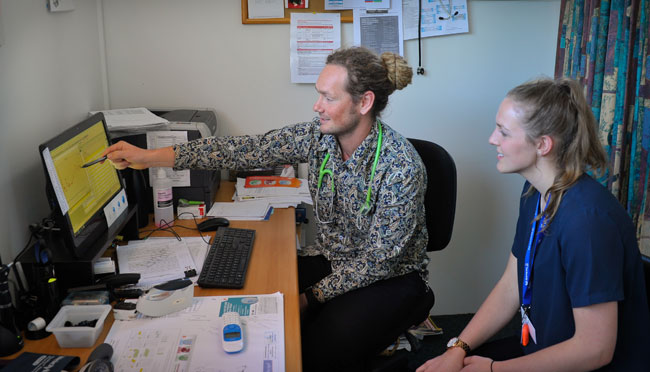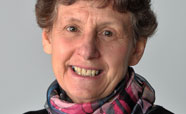 Dr Jed Hocart-Saunders (De Lautour Medical Centre) and Millie Keown (Dietetic student, University of Otago)
Dr Jed Hocart-Saunders (De Lautour Medical Centre) and Millie Keown (Dietetic student, University of Otago)
A comprehensive survey in the lower North Island and South Island has revealed that general practices, although crucial for teaching our future health professionals, are at training capacity.
The major stocktake of general practices by the University of Otago, Wellington (UOW), appears in the New Zealand Medical Journal this week. It was done alongside a comparable survey in the upper North Island by the University of Auckland.

Professor Sue Pullon
The research, led by Professor Sue Pullon and Dr Samantha Murton of the UOW Department of Primary Care and General Practice, found that most general practices in the region are already involved in training doctors, nurses and other health care professionals.
“GPs and practice staff say there is little space at present for increasing numbers of trainees in practices,” says Dr Samantha Murton.

Dr Samantha Murton
“In the future, under the current system, they say they would have to reduce the number of undergraduate trainees if they are going to take on more of those who are in a postgraduate or vocational training position (junior doctors and GP registrars),” she says.
This comes at a time when there are increasing numbers of students in both medical schools, increasing numbers of postgraduate and vocational trainees and reducing numbers of GPs to supervise due to the ageing GP workforce.
“High quality primary care is an essential and pivotal part of New Zealand's health system, and adequate training in primary care settings, for any health professional, is essential to support the present and future health of all New Zealanders.
With patients' consent and support, practice teachers provide essential clinical workplace experience under appropriate guidance and supervision. Most of this training is for medical trainees, although it also includes training of nurses and other health professional students, the authors say.
“To resolve the training capacity issue, three key things are needed – robust and equitable co-ordination between all agencies involved in placing trainees, more training and support for teaching staff at practices, and for smaller practices, help to build additional consultation rooms. To achieve that we need a coordinated effort across the training system,” says Professor Pullon.
“The survey results suggest that there also needs to be support for teaching in different ways, which will help to make more room for quality teaching in general practice,” says Dr Murton.
For further information contact:
Professor Sue Pullon
Department of Primary Health Care & General Practice
University of Otago, Wellington
Tel: +64 4 385 5995
Email: sue.pullon@otago.ac.nz
Dr Samantha Murton
Department of Primary Health Care & General Practice
University of Otago, Wellington
Email: samantha.murton@otago.ac.nz
A list of Otago experts available for media comment is available elsewhere on this website.
Electronic addresses (including email accounts, instant messaging services, or telephone accounts) published on this page are for the sole purpose of contact with the individuals concerned, in their capacity as officers, employees or students of the University of Otago, or their respective organisation. Publication of any such electronic address is not to be taken as consent to receive unsolicited commercial electronic messages by the address holder.
